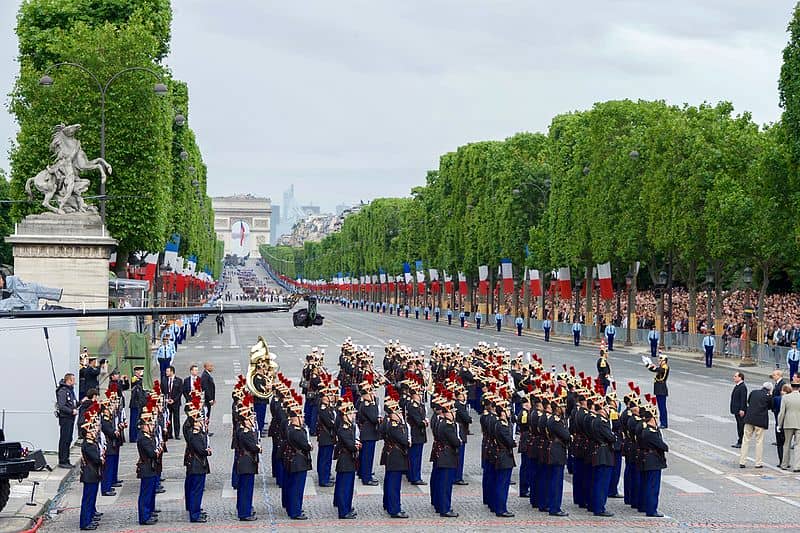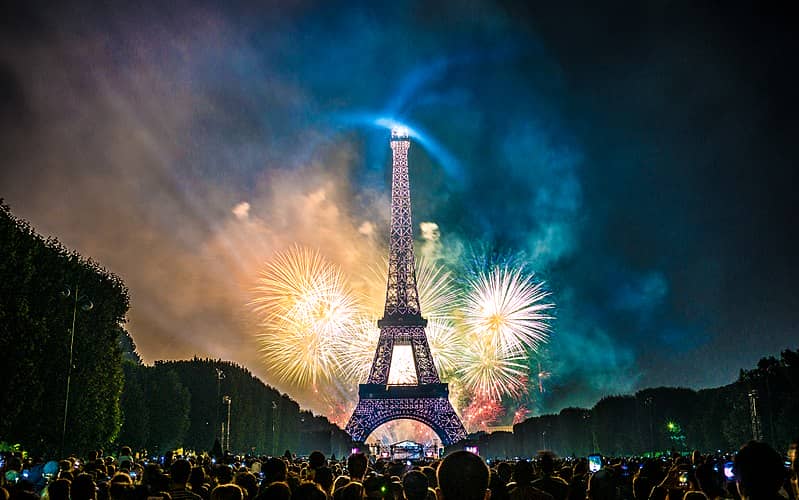Do you know the history behind Bastille Day?
The French like to party. This is evident in many festivals held all over France. One of the major – and perhaps the most important and the most famous – French national festival is the Bastille Day.
Things you'll find in this article
Bastille Day (History, Tradition and Tips)
Let’s take a look at the history and all the things you need to know about this French national day.

What is Bastille Day?
Bastille Day is a public holiday in France, held every 14 July of the year.
France celebrates Bastille Day to commemorate two important events in French history: the Storming of the Bastille and the Fête de la Fédération. These took place on 14 July 1789 and 14 July 1790, respectively.
Bastille Day is a day off for the general French population. Schools, government offices, and most businesses in France are closed every July 14th to observe this very important public holiday.
Bastille Day History
It started on 11 July 1789, when King Louis XVI dismissed his Finance Minister, making the Parisians afraid that they would be attacked by the king’s army and mercenaries. This prompted their own attack on the Bastille, which, at the time, was a symbol of the absolutism of the monarchy.
The storming of the Bastille marked the start of the French revolution. It resulted in the abolishment of feudalism, followed by the proclamation of Declaration of the Rights of Man and of the Citizen (Déclaration des Droits de l’Homme et du Citoyen).
The year after the fall of the Bastille, on 14 July 1790, the National Assembly sponsored the official festival called the Fête de la Fédération. It was a celebration of the unity of the French nation during the French Revolution and was aimed to symbolize peace.
The Fête de la Fédération took place on the Champ-de-Mars, on the day the French recall as the Journée des brouettes or “The Day of the Wheelbarrow.”
The name was in honor of the thousands of Parisians who had worked together to finish the construction needed for this historical event.
The festival was attended by about 260,000 Parisians. King Louis XVI and his confidante, the Marquis de La Fayette, captain of the National Guard of Paris, took their oaths to the constitution.
After the official celebration, the feast went on for four days with the pouring of fine wine and impressive fireworks displays. People also ran naked through the streets to symbolize and express their freedom.
What do French people do in Bastille Day?
Bastille Day is not only a commemoration of an important chapter in France’s history; it is also a day of celebrations of French culture.
On July 14th, crowds gather to attend large-scale public celebrations in Paris and all over France. These celebrations include dances and street parties – and more importantly, the following:

The Bastille Day Military Parade
The Bastille Day military parade is also known as the 14 July military parade. This French military parade has been held in Paris every morning of 14 July each year since 1880.
Communal Meals
For breakfast, the typical food served on Bastille Day include pastries, crepes, brioche, and croissants. Lunch consists of quiche, onion soup, and pâté. Dinner is the time for delectable dishes made of bread, cheese, and tarts – and topped with red wine.
Firemen’s Balls
Fire stations in Paris and surrounding areas throw Bals des Pompiers (Firemen’s Balls) to celebrate Bastille Day. This tradition has been part of the Bastille Day festival since 1937.
Musical Performances and Concerts
Symphonic concerts are held to celebrate Bastille Day. These are free concerts on popular venues such as the Champ-de-Mars.
Classic popular songs about the 14th of July become alive, some of which are “14 Juillet,” “Douce France,” and “Song of Roland”.
Spectacular Fireworks Displays
The annual Bastille Day festival in Paris and all of the Île-de-France region is ablaze with spectacular fireworks display organized by the Mairie de Paris.
Where to find the festivities for Bastille Day?

Champs-Elysees
The oldest and largest military procession in Europe, the Bastille Day military parade occurs on July 14 morning of in the Champs-Elysées in Paris. It is attended by the French president and senior officials along with foreign guests.
Fire Stations in all the arrondissements of Paris
The famous Firemen’s Balls take place at fire station in all arrondissements in Paris from 9 PM until 4 AM. People of all ages are welcome to join this fun- and champagne-filled all-night soirées.
Champ-de-Mars
Thousands of people flock to the Champ-de-Mars to witness the spectacular pyrotechnic show. Champ-de-Mars is also the venue for concerts during the festival.
Eiffel Tower
Fireworks displays occur in all French cities, but the most famous of all takes place in Paris on the night of 14 July. The pyrotechnic show is best admired on the 1st or 2nd floor of the Eiffel Tower. The show starts at 11 PM and lasts for about 35 minutes.
Buy your ticket online here.
Bastille Day Tips for First-Timers
If you’re joining the Bastille Day festivities for the first time, you can spend the entire day hopping from one event to the other. Here’s a list of things to enjoy on your first Bastille Day in Paris:

1. Hit the Champs-Elysées to witness the military parade in the morning. It’s your chance to see the French president in person!
2. Entry to the Louvre and other museums is free on Bastille Day so take this opportunity to see their permanent collections without spending. Other famous monuments in Paris and the surrounding areas are also free.
3. Watch a concert at the Champ-de-Mars to hear French patriotic songs performed live.
4. You can enjoy the fireworks display in various ways. You can do it from the streets while you party with the crowd, on your hotel balcony, or while on a cruise on the Seine. However, the perfect vantage point to watch the pyrotechnic show is definitely at the Eiffel Tower.
5. You can’t end your first Bastille Day without going to a Fireman’s Ball at a local fire station.
6. Bastille Day is an opportunity to enjoy famous French delicacies. Sample the traditional French dishes the locals eat on Bastille Day.
Bastille Day French Vocabulary
For the non-French, the national holiday observed in France on the 14th of July is called “Bastille Day.” The French, however, never call it that way.
For the French people, Bastille Day is Le Quatorze Juillet (“14th of July”) or La Fête Nationale (“National Day”).
Here are more Bastille Day-related French words to get by on your first Bastille Day:
“La Marseillaise” – the French national anthem
Fête de la Fédération – Federation Party
Vive la France – “Long live France”
Vive le 14 juillet – “Long live the 14th of July”
Joyeux 14 juillet / Bonne fête nationale – “Have a good national day”
Défilé militaire du 14 juillet – “Bastille Day military parade” / “the 14 July military parade”
Fête – party
Fête de rue – street party
Les feu d’artifice – fireworks
La danse – dance
Un bal populaire – popular dance
Un concert – concert
Bals des Pompiers – Firemen’s Balls

Hi, I’m Christine – a full-time traveler and career woman. Although I’m from the Philippines, my location independent career took me to over 40 countries and lived in 4 continents in the last 10 years, including France. A self-proclaimed Francophile, I love everything France.
